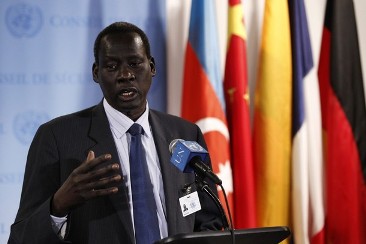South Sudan foreign minister should resign over Abyei comments: FDs
March 22, 2016 (JUBA) – A group of South Sudanese former political detainees (FDs) has issued a statement calling for resignation of Barnaba Marial Benjamin, minister of foreign affairs and international cooperation, over the recent comment he made about Luka Biong Deng of Abyei region, as not being a South Sudanese citizen.

Led in Juba also by a son of Abyei region, Deng Alor Kuol, who also eyes the position of the foreign ministry as the group has nominated him to take over from Benjamin per power sharing arrangements of the August 2015 peace deal, added that any other official or minister involved in drafting that statement should resign.
“We call on the ministers who are responsible for this saga to voluntarily resign their positions or else be dismissed by the president,” partly reads the FDs strong worded statement extended to Sudan Tribune on Tuesday.
“Otherwise, parliament should summon these ministers for grilling and possible sanction, including withdrawal of confidence in them for bringing the country into disrepute,” the statement said.
Abyei people of Ngok Dinka ethnic group, according to the release, are recognized by the 2011 transitional constitution of the Republic of South Sudan under article 1 (2) B) as part of South Sudan and has been the basis of the employment and participation of many of the natives of the area in government institutions as part of their rights and obligations.
The statement, which Madut Biar Yel was made to sign it on behalf of the FDs group, further cited that Luka Biong Deng himself served as the minister in the office of the president of the government of Southern Sudan before secession of the region from neighbouring Sudan in 2011 on the ground of being considered as Southern Sudanese national.
“In our considered opinion that the statement presented to the United Nations high commission for human rights is inconsiderate, ill advised, unconscionable and certainly unconstitutional and out ought to be challenged,” the group said.
“It is a gaffe that has not only rubbished our brothers and sisters from Abyei unfairly but has also brought an embarrassment and shame to the president, government and the people of South Sudan at large.”
Minister Barnaba Marial Benjamin, according to the official response of the government to the report of the office of the high commissioner for human rights assessment mission to improve human rights, accountability, reconciliation and capacity in South Sudan, issued on 9 March, 2016, described Luka Biong Deng, as a non-South Sudanese national.
In the statement the foreign minister signed he considered Deng as citizen of the neighbouring Sudan hired by the University of Juba from which his services were terminated after organizing a public debate about the unilateral creation of the controversial 28 states by President Kiir in late 2015.
Minister Benjamin, although he admitted having included the comment in the statement he signed, however denied the response meant to deny Deng as citizen of South Sudan and blamed it on his officials who drafted the statement. He also cited lack of proof reading of the response before he signed its cover letter.
He apologized for the mistake and said he would correct it and resend another version of the statement to the world’s human rights body, which had already received the document.
The people of Abyei have been in dilemma for the past 10 years, not sure of their which country they belonged to between Sudan and South Sudan.
Although the people of Abyei were supposed to conduct a separate referendum simultaneously with the people of South Sudan in order to choose between the two countries, that plebiscite could not take place due lack of agreement over its terms.
A unilateral referendum they conducted in 2013, which resulted to joining South Sudan, was not recognized by both governments of South Sudan and Sudan.
(ST)
